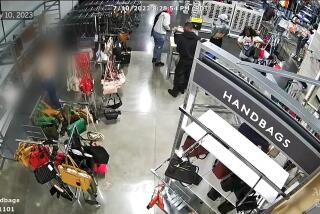U.S. Plans List of Clothes Makers, Retailers That Obey Labor Laws : The Goal Is to Help Consumers Boycott Products Made in Sweatshops, Drive Out Rogue Contractors
- Share via
Want to avoid buying a sweat shirt made in a sweatshop?
Labor Department officials hope to tap that consumer sentiment in their latest assault on workplace abuses in the clothing manufacturing industry.
The day after Thanksgiving, just as the Christmas shopping season begins in earnest, the agency plans to announce names of “good guy” apparel retailers and manufacturers. These will be firms that, in the Labor Department’s judgment, are taking extra precautions to ensure that their merchandise is being made by law-abiding contractors--and not by the widespread sweatshop operators running roughshod over workplace wage and safety laws.
The intent is to squeeze out the rogue contractors by providing a public relations bonanza for “retailers and manufacturers that have gone the extra mile in seeking to prevent sweatshop abuses,” Labor Secretary Robert B. Reich said in an interview.
While acknowledging that not all consumers will be swayed by his department’s lists, Reich said the initiative can have “a considerable economic impact” even if only a modest number of shoppers decide to shun merchandise that may have been made in U.S. sweatshops.
But the planned retail and manufacturer lists, spurred by the discovery in August of an El Monte sweatshop where 72 Thai workers labored under alleged prison-like conditions, has come under fire from industry groups.
For starters, industry officials question whether the Labor Department can do a fair job of determining who is making a good-faith effort to shun sweatshops.
That is especially true, they say, given how little time remains before the initial list comes out in three weeks.
Moreover, the criteria for “good guy” retailers are fuzzy. Generally speaking, the retailers will be required to provide training, cooperate in labor law enforcement efforts and otherwise “demonstrate a meaningful commitment” to selecting manufacturers and contractors with good records.
Among manufacturers, a major complaint is that the initial list will consist largely of companies that previously ran into trouble with regulators and subsequently signed agreements with the government pledging to mend their ways.
“Most of our members don’t want to be on that list because they don’t want to be associated with the ones that were busted,” said Allison Wolf, a spokeswoman for the American Apparel Manufacturers Assn., an Arlington, Va.-based trade group that says it represents three-quarters of the domestic industry.
For instance, one manufacturer described as likely to be on a “good guy” list is L.F. Sportswear of Los Angeles. The firm signed a compliance agreement with the government in August after investigators concluded that it bought merchandise made in the El Monte sweatshop.
Labor Department officials say, however, that many of the companies signing “long-form” compliance agreements and similar pledges--such as Los Angeles jeans maker Guess? Inc.--have become among the most aggressive in policing contractors.
“The focus is on current behavior and what will be done in the future,” rather than what was done in the past, a department spokesman said.
A major loophole in the Labor Department’s program is that it won’t take into account contracting practices overseas, where many of the worst sweatshop abuses occur. “There is no excuse for tolerating Third World working conditions in the United States,” Reich countered.
“We need to clean up our house before we can accuse others of having to clean up their houses.”
While trade associations representing manufacturers and retailers point the finger at each other, Reich’s answer is to pressure both groups to play a greater role in fighting sweatshop abuses.
“A foolproof formula is not available, but manufacturers and retailers are doing far more than ever before, and there’s no reason why others shouldn’t be able to do so as well,” he said.
“The government can’t root it [sweatshop abuses] out on its own,” Reich said. “Now is business’s chance to exercise responsibility.”
Meanwhile, the Labor Department continues to work on such issues as what to call the lists of selected retailers and manufacturers. One proposal was to call the listings an “honor roll,” while another idea that was preferred by some retailers was to call the cited companies “trendsetters.”
Officials are also looking into ways to publicize the names of the retailers and manufacturers after the original lists are announced.
* GARMENT INTRIGUE: Killings of Carole Little executives still a mystery. A1.
(BEGIN TEXT OF INFOBOX / INFOGRAPHIC)
Cutting Off the Sweatshops
The Labor Department this month plans to release the names of clothing manufacturers and retailers that have taken extra measures to ensure they will not do business with sweatshop contractors. The initial manufacturers list is expected to consist largely of firms that signed agreements, often under pressure from government regulators, to avoid such contractors. Some Southern California clothing manufacturers that have signed the agreements,
Guess?, Los Angeles
Cross Colors, Compton
Francine Browner, Los Angeles
Swat/Fame, Los Angeles
Chorus Line, Vernon
Rampage, Los Angeles
L.F. Sportswear, Los Angeles
California Concepts, Gardena
Source: Labor Department
More to Read
Inside the business of entertainment
The Wide Shot brings you news, analysis and insights on everything from streaming wars to production — and what it all means for the future.
You may occasionally receive promotional content from the Los Angeles Times.










